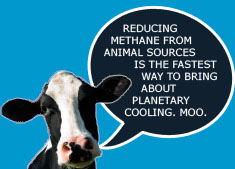Livestock Industry and Global Warming
A UN report concludes that animal agriculture is responsible for 18% of total greenhouse gas emissions, more than all transportation in the world combined.
The most under reported cause of global warming is the livestock industry, which accounts for a minimum of 18 percent of global warming, and, according to more updated information, is possibly responsible for 50 percent or more of the current emissions in the atmosphere.
Lowering emissions by eliminating animal products from your life is one of the fastest, cheapest and most effective methods one can take to not only lower global emissions, but to bring abut rapid planetary cooling.
Easy to implement. Eating a plant-based diet to lower emissions requires no infrastructure investments, capital investment or government rebates.
Lowers monthly costs. Plant-based diets ends up reducing monthly costs for consumers immediately.
Improves health, lowers weight. A well planned vegan diet is likely to improve health and result in a reduction in weight.
Cools the planet faster. Reducing emissions through a shift from a meat- and dairy-laden diet will bring about more rapid cooling than a reduction of CO2 emissions through any other option.
Tastes great. As Oprah Winfrey attests, once you learn how to incorporate a vegan diet into your life, the food tastes great, leaving one satisfied and well-nourished.
“Wow, wow, wow! I never imagined meatless meals could be so satisfying. I had been focused on what I had to give up..."What's left?" I thought. Apparently a lot. I can honestly say every meal was a surprise and a delight...” Oprah Winfrey, commenting on her 21 day vegan 'cleanse'
Livestock’s Long Shadow
The livestock group within the United Nations’ Food and Agriculture Organization evaluated the comprehensive environmental damage resulting from raising animals for food and other purposes, concluding the livestock sector is one of the leading causes of environmental degradation on the planet. The report, Livestock’s Long Shadow, states:
“The livestock sector emerges as one of the top two or three most significant contributors to the most serious environmental problems, at every scale from local to global. The findings of [Livestock’s Long Shadow] suggest that it should be a major policy focus when dealing with problems of land degradation, climate change and air pollution, water shortage and water pollution and loss of biodiversity."
“Livestock’s contribution to environmental problems is on a massive scale...The impact is so significant that it needs to be addressed with urgency.”
By using a global warming potential estimate for methane of 23 times that of CO2, the UN concluded that livestock were responsible for 18 percent of total global emissions, more than all transportation in the world, which only produces an estimate of 13 percent of global emissions. However, because this global warming potential estimate is low (link to section below), it is believed that emissions from meat and dairy consumption are significantly higher than the 18 percent estimate of the UN FAO.
The researchers determined that livestock are responsible for the creation of 9 percent of human-caused CO2 emissions, 37 percent of human-caused methane emissions, and 67 percent of human-caused nitrous oxide emissions. Animals raised as livestock by humans are the single largest source of human-caused methane and nitrous oxide emissions on the planet.
Methane: Hotter than they are leading us to believe.The global warming potential estimate of 23 is misleading and significantly under-estimates the role livestock play in global warming. Methane has an atmospheric lifetime of nine to 15 years, meaning the methane has dissipated out of the atmosphere within that time, leaving behind a residual that still continues to warm the planet.
For example, twenty years after a cow belches methane into the atmosphere (and five to 11 years after it’s atmospheric lifetime has ended and the methane has dissipated out of the atmosphere) the methane has a global warming potential of 62 times that of CO2. A hundred years after that cow belched her methane into the atmosphere, that belch is still warming the planet, but its global warming potential has dropped to only 23 times that of CO2.
This raises a really powerful question. If the residual methane left in the atmosphere five or more years after the atmospheric lifetime of methane is passed, how hot is methane during its atmospheric lifetime? And what does that say about the need to lower emissions from livestock?
During a September 2008 panel discussion sponsored by Compassion in World Farming in London, Dr. Rajendra Pachauri, head of the UN’s Intergovernmental Panel on Climate Change, stated that prominent scientists were calling him up and telling him that the emissions from livestock were much, much higher than current estimates. During an interview with Supreme Master Television, Dr. T. Colin Campbell, the nutritional biochemist who led the China Project/Study, stated reputable scientists at the World Bank had indicated to him that livestock emissions make up 50 percent or more of the emissions currently in our atmosphere.
The Fastest Way to Cool the PlanetWith the Earth rapidly approaching and surpassing critical tipping points, halting global warming immediately has become urgent. Right now, government programs and public emissions reduction efforts are focused on lowering our CO2 emissions. This is great, however, because the atmospheric lifetime of CO2 is so much longer than methane, and because its residual global warming potential will still be felt 500 or a 1000 years later, reductions in CO2 emissions are not going to bring about rapid planetary cooling.
Scientists are increasingly telling us that because methane dissipates out of the atmosphere much more quickly than CO2, that lowering methane emissions are the fastest way to bring about planetary cooling. And because animals are the greatest source of methane emissions, the less meat- and dairy we consume, and the more plant-based foods we consume, the quicker the planet will begin to cool.
The following reports on the emissions from animals are based upon misleading methane global warming potential estimates around 23 times that of CO2. This means that these reports under estimate the role of meat and dairy consumption on global warming.
Eating a plant-based diet reduces more emissions than buying a hybrid car.Researchers at the University of Chicago evaluated the emissions throughout the food production chain if one were consuming the average diet and compared it to a diet of equal calories where all the calories were consumed in the form of plant-based foods. They determined that the average meat and dairy consumer was responsible for about 1.5 tonness of emissions per year than a person consuming a purely meat- and dairy-free diet. By comparison, they also calculated that switching from the average car to a Toyota Prius would save only 1 tonne of emissions per year, clearly indicating you will succeed in a significant reduction of your emissions if without spending the money on a new energy-efficient car by just eating more plant-based foods. Concluding that the average American was responsible for 1,485 kg in emissions over a person consuming a plant-based diet.
Plant-based eating reduces 7 times more emissions than eating local foods.
Most people promoting “locavore”or local eating evaluate only the transportation emissions. However, transportation emissions are actually only a small portion of the overall emissions created in the food production process. A study done at Carnegie Mellon University in Pennsylvania, USA evaluated the emissions produced throughout the production lifecycle of food in the US diet, concluding that only 11% of emissions come from transportation. Agricultural and industrial practices account for the remaining 83% of emissions from the American diet. The Carnegie Mellon Researchers found that emissions from animal products were responsible for 58% of the emissions in the American diet, and that by going vegan just one day per week, more emissions would be saved then by eating locally all year long.
94 % of dietary emissions are reduced by switching to an organic, plant-based dietSwitching from a conventionally-raised, meat- and dairy-based diet to an organic plant-based diet reduces the emissions from your diet by 94 percent. Research by Foodwatch in Germany became the first to comprehensively measure greenhouse gas emissions from various dietary choices, including conventional vs. organic farming.
The average meat eater consuming traditionally-farmed foods with herbicides and pesticides is responsible for the carbon dioxide emissions-equivalent of driving 4,758 kilometers each year.
Eating organic, sustainably-raised meats, dairy and produce will reduce emissions 8 percent to 4,377 kilometers.
Eating a vegetarian diet, including dairy products, reduces emissions by about half, to the equivalent of driving 2,427 kilometers each year.
Eating an organic vegetarian diet reduces the emissions an additional 18.5 percent to the equivalent of driving 1,978 kilometers.
A conventionally-grown vegan diet (vegetarian with no dairy or eggs) reduces emissions to the equivalent of driving 629 kilometers each year.
An organic vegan diet, which creates the equivalent carbon footprint of driving 281 kilometers, or 6.4 percent of the emissions of an organic omnivore and 5.9 percent of the emissions created by an omnivore eating non-organic foods.

Click here to view

Eco-Eating facts on meat diet vs. Plant-based diet (1.5 minutes)
THE GREEN PLANET AWARDS RAISE AWARENESS ABOUT THE CRITICAL SITUATION THE ENVIRONMENT IS CURRENTLY IN & HUMAN ACTIONS WHICH INFLUENCE CLIMATE CHANGE![]()
COOL LINKS
Wake Up, Freak Out
Take Aim At Climate Change
Save The Human Music Vid
GENERAL LINKS
Price of Meat
Meat The Facts
Veg Source
Earth Save
Monga Bay
NASA
Eco-eating
SEI
ENFO
Cultivate
Friends of the Earth
United Nations FAO
Hunger Site
One World
Diet, Energy, & Global Warming
HEALTH LINKS
Nutrition Ecology International Center NEIC
The Cancer Project
PCRM
Nutrition MD
Human Herbivore Physiology
ENVIRONMENTAL LINKS
Answering the sceptics
Tree Hugger
Sea Shepard Conservation Society
Permaworld
Grist
VNV.ORG.AU
UN News Centre
Science Daily
Science Daily: Poison ice
Time: Health and Science
Common Dreams
Global Stewards
The Independent
National Geographic
DotEnvironment
Green Peace Reports
IVU
![]()
Vegan: The New Ethics of Eating by Erik Marcus
The Food Revolution by John Robbins
Healthy at 100 by John Robbins
A Delicate Balance (film)
Meat The Truth (film)
The 11th Hour - Narrated by Leonardo DiCaprio (film)
![]()
